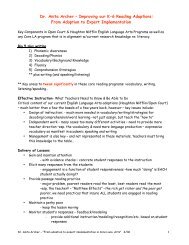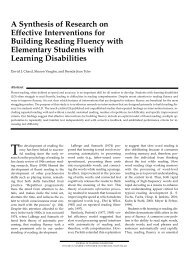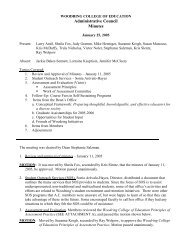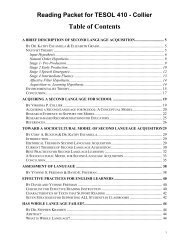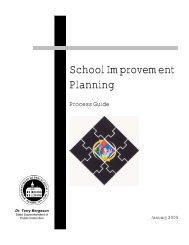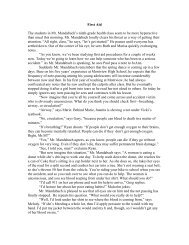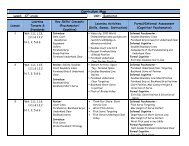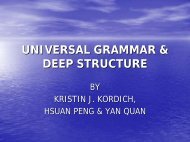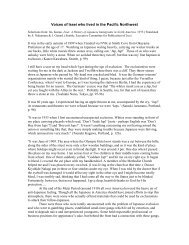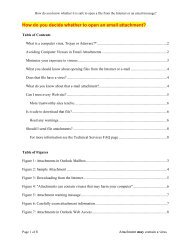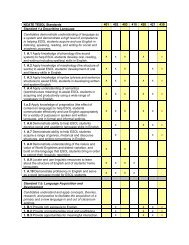2. Educate those who administer standardized tests that different styles <strong>of</strong> communicationare used by various cultural groups;3. Review and revise classroom tests to eliminate cultural bias; and4. Address cross cultural communication issues in all phases <strong>of</strong> school life.Suggestions for classroom utilization have been made throughout <strong>the</strong> booklet. The rest is up toyou. Cross cultural communication is an ongoing process. Mistakes are inevitable, but sensitivityto cultural and communication issues can enhance <strong>the</strong> quality <strong>of</strong> education for all students.Some Attributes <strong>of</strong> Field <strong>In</strong>dependent and Field Dependent Cognitive Styles (Adaptedfrom Ramirez and Castaneda, 1974).Student CharacteristicsOverall characteristicsRelationship to peers:Personal relationship toteacher:<strong>In</strong>structional relationshipto teacher:Characteristics <strong>of</strong>curriculum that facilitatelearning:Field <strong>In</strong>dependent CognitiveStyleFocuses on parts, ra<strong>the</strong>r thanon <strong>the</strong> wholeIs reality oriented to objectsand analyses <strong>of</strong> discreteelementsDemonstr<strong>ates</strong> topic centerednarrative stylePrefers to work independentlyLikes to compete and gainindividual recognitionIs task oriented and inattentiveto social environment whenworkingRarely seeks physical contactwith teacher<strong>In</strong>teracts with teacher to tasksat handLikes to try new tasks withoutteacher's helpIs impatient to begin tasks;likes to finish firstSeeks nonsocial rewardsDetails <strong>of</strong> concepts areemphasized; parts havemeanings <strong>of</strong> <strong>the</strong>ir ownMa<strong>the</strong>matics and scienceconcepts are emphasizedEmphasis placed on discoveryField Dependent Cognitive StyleFocuses on <strong>the</strong> whole, ra<strong>the</strong>r than <strong>the</strong>partsIs reality oriented to relationships andsocial attributesDemonstr<strong>ates</strong> topic associatingnarrative styleLikes to work with o<strong>the</strong>rs to achievea common goalLikes to assist o<strong>the</strong>rsIs sensitive to feelings and opinions<strong>of</strong> o<strong>the</strong>rsOpenly expresses positive feelingsfor teacherAsks questions about teacher's tastesand personal experiences; seeks tobecome like teacherSeeks guidance and demonstrationfrom teacherSeeks rewards which streng<strong>the</strong>nrelationship with teacherIs highly motivated when workingindividually with teacherPerformance objectives and globalaspects <strong>of</strong> curriculum are carefullyexplainedConcepts are presented in humanizedor story formatConcepts are related to personalinterests and experiences© 2008 Dr. Ca<strong>the</strong>rine CollierAll Rights Reserved76
<strong>Art</strong>icle II.3 Hard Work Hypo<strong>the</strong>sis: Is Doing YourHomework Enough to Overcome <strong>the</strong> Effects <strong>of</strong>Poverty?Stephen KrashenMulticultural Education 12 (4): 16-19, 2005It is well-established that <strong>the</strong> effects <strong>of</strong> poverty are devastating forchildren in school. More generally, scholars have documented thatlow "socio-economic status" (SES), whe<strong>the</strong>r measured by familyincome, parent education, or parent occupation, is usually <strong>the</strong> mostpowerful predictor <strong>of</strong> achievement and test score performance,sometimes swamping all o<strong>the</strong>r factors (White, 1982). This advantagetransl<strong>ates</strong> to life success; children <strong>of</strong> <strong>the</strong> wealthy are far more likelyto become wealthy, become pr<strong>of</strong>essionals, and attain positions <strong>of</strong>power than children <strong>of</strong> <strong>the</strong> poor. (Simonton, 1994). Simonton, in fact,concludes that "<strong>the</strong> log cabin myth is just that, pure myth" (p. 157).There have been some recent challenges to this generalization, however, claims that somechildren, especially Asian immigrant children and <strong>the</strong> children <strong>of</strong> Asian immigrants, do very welleven though <strong>the</strong>y come from high-poverty backgrounds. Two such cases are <strong>the</strong> "Boat People" <strong>of</strong>Vietnam, who arrived in <strong>the</strong> US in 1978, and <strong>the</strong> Hmong.The Boat People and <strong>the</strong> Hard Work Hypo<strong>the</strong>sisThe Boat People, according to Caplan, Choy and Whitmore (1992) came only with "<strong>the</strong> clo<strong>the</strong>son <strong>the</strong>ir backs." Never<strong>the</strong>less, <strong>the</strong>ir children did well in American schools. Caplan et. al., (1989,1992) examined a subset <strong>of</strong> <strong>the</strong>se children (n = 355) in grades K through 12 and reported that<strong>the</strong>ir overall grade point average was 3.02, nearly exactly a B, and <strong>the</strong>y did especially well inmath: A group <strong>of</strong> high school students from <strong>the</strong>ir sample (n = 97) scored at <strong>the</strong> 72 nd percentile on<strong>the</strong> math CAT.How did <strong>the</strong>y do it? Hard work and family values, according to Caplan et. al., with lots <strong>of</strong>homework (a specific time set aside for homework every evening, with older children helping<strong>the</strong> younger ones. Caplan et. al. document this: Those in high school averaged three hours andten minutes homework per evening, those in junior high two and a half hours. The US averagefor junior high and high school is 1.5 hours.The Hmong and <strong>the</strong> Hard Work Hypo<strong>the</strong>sisThe Hmong, immigrants from Laos, also appear to support <strong>the</strong> Hard Work hypo<strong>the</strong>sis, <strong>the</strong>hypo<strong>the</strong>sis that hard work (homework) can overcome <strong>the</strong> disadvantages associated with poverty.As a group, <strong>the</strong> Hmong are among <strong>the</strong> poorest <strong>of</strong> immigrant groups and are among <strong>the</strong> leasteducated. For <strong>the</strong> 14,000 Hmong in California in 1990, median household income was $16,000per year, compared to <strong>the</strong> <strong>the</strong>n national average <strong>of</strong> $36,000 (<strong>Un</strong>iversity <strong>of</strong> Wisconsin, 2000).Only 3% <strong>of</strong> <strong>the</strong> Hmong in California had graduated college (<strong>Un</strong>iversity <strong>of</strong> Wisconsin, 2000);© 2008 Dr. Ca<strong>the</strong>rine CollierAll Rights Reserved77
- Page 2 and 3:
"Those who arrive by age 12 or 13 m
- Page 5:
Article I.2 Are Signed Languages "R
- Page 8 and 9:
Biological analyses of the status o
- Page 10 and 11:
and beyond, speaking and signing ch
- Page 12 and 13:
Conclusion: Are Signed Languages Re
- Page 14 and 15:
Article I.3 The Interpreter: Has a
- Page 16 and 17:
A few weeks earlier, I had called F
- Page 18 and 19:
“We struggled even getting to the
- Page 20 and 21:
herself by strapping a cassette rec
- Page 22 and 23:
In 1998, after nine years as the ch
- Page 24 and 25:
momentary burst of excitement that
- Page 26 and 27: can shape core grammar. Because the
- Page 28 and 29: The authors compared animal and hum
- Page 30 and 31: monkey moved. He followed it with h
- Page 32 and 33: delight, fear, laughter, and surpri
- Page 34 and 35: Piipaío in a hut: Pirahã huts typ
- Page 36 and 37: LEP students, and equitable organiz
- Page 38 and 39: 4. Second language development crea
- Page 41 and 42: curriculum or "teaching to the test
- Page 43 and 44: portfolio work was scanned and stor
- Page 45 and 46: experiences of many groups of stude
- Page 47 and 48: While not disagreeing that interpre
- Page 49 and 50: sound educational practice, however
- Page 51 and 52: arises from the efforts to abstract
- Page 53 and 54: Article II.2 Cross-Cultural Communi
- Page 55 and 56: males who can serve as positive rol
- Page 57 and 58: Understanding another culture is a
- Page 59 and 60: Pets and AnimalsWhich animals are v
- Page 61 and 62: to teach standard English is reflec
- Page 63 and 64: Asking personal questions of a pers
- Page 65 and 66: Using Cross Cultural Communication
- Page 67 and 68: Why Do Nonstandard English-Speaking
- Page 69 and 70: Before beginning to teach standard
- Page 71 and 72: • Negative attitudes toward low p
- Page 73 and 74: New standardized tests and assessme
- Page 75: Each of the behaviors listed above
- Page 79 and 80: each point higher in SES, students
- Page 81 and 82: This case does not provide strong s
- Page 83 and 84: Article II.4 Language Acquisition a
- Page 85 and 86: 1992, p. XI). These researchers, wh
- Page 87 and 88: comprehend a word within a specific
- Page 89 and 90: more to the truthfulness of the chi
- Page 91 and 92: This idea of “semilingualism” c
- Page 93 and 94: Article III.1 A Brief Description o
- Page 95 and 96: take different lengths of time to c
- Page 97 and 98: example, should involve the same co
- Page 99 and 100: As with all stages of BICS acquisit
- Page 101 and 102: Assessment techniques at stage 3 ca
- Page 103 and 104: different. Therefore, the social di
- Page 105: integrative motivation. Basically,
- Page 109 and 110: (Ellis, 1985; Hakuta, 1986). Howeve
- Page 111 and 112: that sociocultural processes have o
- Page 113 and 114: Article III.3 How Children Acquire
- Page 115 and 116: phonetic units (unique to signed la
- Page 117 and 118: Article III.4 Toward a Sociocultura
- Page 119 and 120: emember is that the fundamental goa
- Page 121 and 122: The best practices models can be th
- Page 123 and 124: By focusing on the dialectic betwee
- Page 125 and 126: intergenerational wisdom shared by
- Page 127 and 128:
Daily Realities RecappedThe above v
- Page 129 and 130:
traditions. At a time in our histor
- Page 131 and 132:
We will now look at two examples of
- Page 133 and 134:
Speakers communicate fluently, main
- Page 135 and 136:
question the effects of such attitu
- Page 137 and 138:
Article IV.3 Culture Change: Effect
- Page 139 and 140:
and psychological characteristics o
- Page 141 and 142:
Contraryto what wewere expecting, t
- Page 143 and 144:
Article V.1 Assessment in ESL & Bil
- Page 145 and 146:
vocabulary does the student lack?Is
- Page 147 and 148:
whether they are LEP and to provide
- Page 149 and 150:
Fourth, ESL and bilingual program s
- Page 151 and 152:
competent reader/writer. All versio
- Page 153 and 154:
Table 1Comparison of Recent Accultu
- Page 155 and 156:
unilinear model, which measures the
- Page 157 and 158:
an English-only instructional progr
- Page 159 and 160:
Article V.3 Assessment of English L
- Page 161 and 162:
8. Change answers only for a very g
- Page 163 and 164:
Riles, 1979; Jose P. v Ambac, 1983)
- Page 165 and 166:
proficiency is often underestimated
- Page 167 and 168:
Finally, when second language reade
- Page 169 and 170:
for their decisions, noting issues
- Page 171 and 172:
As mentioned above, when the transi
- Page 173 and 174:
ather than generic adjectives and t
- Page 175 and 176:
their imagined points of view. Ther
- Page 177 and 178:
English texts and demonstrate progr
- Page 179:
using inter-district teams). In the




